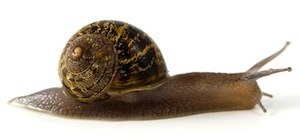Are power naps good for snails and other animals too?
Great pond snails sleep for 10% of their life. You can tell which ones are in the land of nod. They’re the ones hanging on to a solid surface, muscles relaxed and tentacles partly withdrawn.
Most animals have a preferred time for dreaming, but not the great pond snail. It doesn’t seem to need as much as most animals. Maybe it has such an easy life, it doesn’t have the same need as the rest of us to store new memories. After all, animals with more hectic lifestyles have evolved more elaborate ways to control their sleep, such as the box jellyfish, which lives in the tropical waters of Australia.
It’s capable of a killer sting – you’d be dead within minutes if you rubbed it up the wrong way! It sleeps for 18 hours a day on the sea floor, wafted gently by the current.
It’s reckoned that it’s evolved to rest and conserve energy during those times it’s not relying on its 4 sets of 6 eyes to actively hunt vertebrates.
Box jellyfish have a high metabolic rate, which uses up a lot of energy, so how sensible then to conserve it, by moving around less so their energy can be diverted for growth and repair.
It seems in the animal kingdom, it’s the frequent power naps which are good for consolidating memories. However, sleeping for long periods of time however is the domain of the couch potato!


